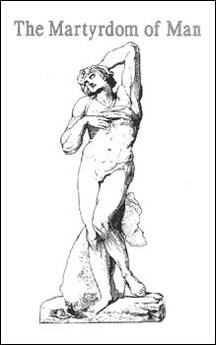


You will hold in your hands the unsung progenitor of the modern "outlines" of history and culture. When initially published, it was to touted in a speech by Gladstone and read avidly by men as discerning as Arthur Conan Doyle, Winston Churchill and H.G. Wells ("an extraordinarily inspiring presentation of human history one consistent process," Wells later wrote.) George Orwell praised it for "an astonishing width of vision" and, most recently, H.R.F. Keating compared its philosophical approach to that of Teilhard de Chardin.
Such was the impact of Winwood Reade's The Martyrdom of Man, a volume that went through at least 17 printings before the turn of the century. And then vanished from sight, and from the public consciousness. Until now! We possess it again, not because of those tributes and not for the rôle its arguments played in the Victorian ascendancy of Rationalism. We possess it now solely because one man considered this book "one of the most remarkable ever penned," If that was the view of Sherlock Holmes, then what care we for S.C. Roberts and his verdict that Martyrdom is "a dreary work." Or the speculation of Owen Dudley Edwards that The Literary Agent was introduced to the book by a German medical student named Bryan Charles Waller, who was to play such an important part in ACD's life.
What matters it that Reade's prose is dense and treacly enough even to plug the gaping holes in the Barque Lone Star; that his rasp of African cultures is as vague as the path of a certain Jezail bullet; that he is more of a gambler with fate than a Covent Market goose-seller who had a Pink'Un protruding from his pocket.
Here is fresh meat for The Great Game. Here are 360 pages not et mined to exhaustion by the legions of earlier Sherlockians. (There are but four citations for Reade in The Universal Sherlock Holmes blessed forever be its creators.) Why did a depressed and listless Holmes turn to the needle in the earlier tales? Look to Reade: "But a season of mental anguish is at hand, and through this we must pass, in order that our posterity may rise. The soul must be sacrificed; the hope in immortality must die.
This is a reprint of an underground classic penned by the English travel writer William Winwood Reade, first publish in 1872 and subsequently reprinted. This facsimile edition includes the full text as well as all known prefaces. The study of mankind's history was written in a now unfashionable rhetorical style but one well suited to the author's theme: "To cultivate the intellect is therefore a religious duty; and when this truth is fairly recognized by men, the religion which teaches that the intellect should be distrusted, and that it should be subservient to faith, will inevitably fall."
Clothbound, No Dust jacket, 342p.
ISBN 1-896032-46-X $30.00